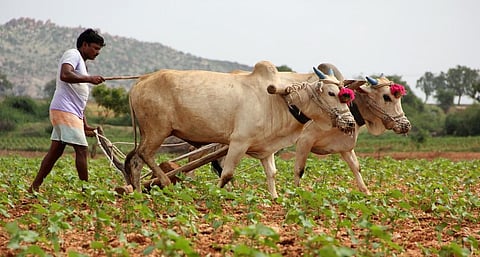

India developed the concept of farmer producer organisations (FPO) in early 2000s to help small farmers gain economies of scale and improve their market standing by negotiating collectively. FPOs can be a registered company (farmer producer company or FPC) or a cooperative, among others.
In 2019, the Government of India launched a scheme, Formation and Promotion of 10,000 Farmer Produce Organisations, to form and promote 10,000 new FPOs in the country by 2024, with a budgetary provision of Rs 6,865 crore.
Under this scheme, the formation and Promotion of FPOs is to be done through nine implementing agencies, such as Small Farmers Agri-Business Consortium (SFAC), National Cooperative Development Corporation (NCDC) and National Bank for Agriculture and Rural Development (NABARD).
Implementing agencies will engage cluster-based business organisations (CBBOs), introduced under the scheme, to aggregate, register and provide professional hand-holding support to FPOs for a period of five years.
CBBOs have been empanelled and engaged by implementing agencies. CBBOs will be the platform for an end-to-end knowledge for all issues related to FPO promotion.
Any legal entity registered in India and in existence for past three years is eligible to be a CBBO.
The agency should have a minimum average turnover / utilisation of funds of at least Rs 2 crore for the plains and Rs 1 crore for Himalayan and northeastern region during the past three years, with a positive net worth.
Institutions promoted by Public Sector Agricultural Universities, Indian Council of Agricultural Research / Krishi Vikas Kendras or other similar institutions of Central / state governments are exempt from this requirement.
Implementation agencies pay CBBOs Rs 25 lakh per FPO over a period of five years for the cost incurred in formation and incubation of the FPO.
The process of creation of FPO starts with CBBO identifying a produce cluster area (a contiguous or compact geographical area, with similar agricultural produce) and undertaking a feasibility survey.
Next, it mobilises potential producers and shares with them the business idea, viability, market size and risks. CBBO then prepares a business plan with participation of farmer members.
The business plan will cover the entire end-to-end value chain, including those of production, post-production, marketing, value addition and exports.
The Union agriculture ministry mandated SFAC, an autonomous registered society promoted by the ministry, to facilitate this process and to support the state governments in the formation of FPOs.
CBBOs should form an FPO with a minimum farmer-members size of 300 to be eligible under this scheme in the plains while in hilly and northeastern regions, an FPO should have a minimum farmer-members size of 100.
As of June 30, 2022, some 535 FPOs are registered under the scheme, with around 55 CBBOs as promoting or consulting agencies, according to data with SFAC.
The CBBOs include some big names like Grant Thornton Bharat LLP, Pricewaterhouse Coopers Pvt Ltd, Isha Outreach and ITC Ltd. Some of these companies, like Star Agriwarehousing and ITC, are involved in large-scale agriculture businesses.
Overall, there are a total of 16,000 FPCs in the country, as of February 2023, according the Union Ministry of Corporate Affairs. The largest increase in the number has happened in the last three years: 2020-21, 2021-22, 2022-23, when 65 per cent of the FPCs were registered.
In 2020-2021, even as the country faced an unprecedented pandemic and many companies were closing down, a whopping 6,000 FPCs were registered.
This was first published in the 16-30 April, 2023 print edition of Down To Earth